
Luli Gray was an adorable and spoiled little girl, a brilliant student who barely made it through high school, a confused and very young bride, a vagabond in Europe, a waitress, file clerk, janitor, aspiring actress, professional cook, and finally in her mid-forties a successful writer. Most important to me, she was my sister. If you are lucky enough to love a sister, you know that the bond is deep and strong. You share memories back to your earliest days, and the giggling girls are still there in old age.
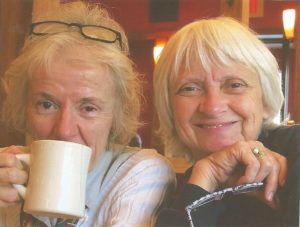
Luli and Me
After Luli died, as I searched through Windows Explorer for pictures, I came across the draft of an essay she wrote in her late fifties. She had heard Susan Farrell, the great ballerina, talking about her life. Farrell had wanted to be a dancer since childhood, and she worked hard and steadily to follow that path. She had no regrets. Luli envied her. She wrote:
I have backed into my life like a bird into a propeller blade, squawking and flapping. Sometimes I have felt torn apart like that bird, thinking I would never fly again, or even survive. And if someone asked me, ‘Do you have any regrets?’ I would say, ‘Yes. Many.’ I do not dwell on them very often, and sometimes I suspect that my disasters as much as my successes have made this odd Mulligan stew of talent, terror, laughter, despair, joy and rage that is me. Sometimes I quite like the stew. But there was no clear path, ever.
Luli was finally making an adequate living as assistant to a food writer, with side gigs as a recipe developer, when she began writing seriously.
I scribbled short stories and sent them to magazines. Lots of stories. Lots of magazines. Lots of rejections. Apparently, nobody wanted my stories. I kept on writing. I got up at 5AM six days a week so I’d have time to write before leaving for work. I sent out stories; they came back. I sent them out again. One day, after a year of this, a story began to grow. It had a dragon in it, and a child. Could I possibly be writing a children’s book? Yes. Holy cow.
I wrote the first draft at white heat, in less than two weeks. I wrote and rewrote and sent it out to a few agents. Three weeks later I had an agent and a book contract with a major publisher. Finally, after more than forty years, I have found a passion that sustains me, a desire to keep reaching for my unexpected, unattainable star.
Luli followed the first novel, Falcon’s Egg, with a memoir of our father that she drafted in a 24-hour writing contest, which she won. She returned to Falcon with two more books, and then wrote Timespinners, a book about a brother and sister whirled away to the good old days of Neanderthals and wooly mammoths. An auto-didact who read widely (she re-read Moby Dick, including the whaling sections, every couple of years), Luli was fascinated by Neanderthals. She turned to Aesop, and wrote Ant and Grasshopper, a picture book with beautiful illustrations by Giuliano Ferri. This took years. As any writer knows, telling a story in 750 words is a lot harder than 75,000.
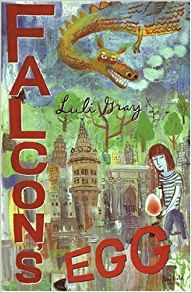
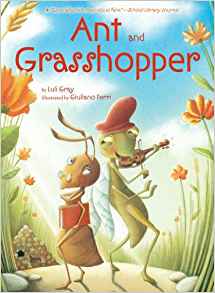
Luli was her own most severe critic. She acknowledged the worth of Falcon’s Egg, a Newbery Notable, but dismissed the rest except for Ant and Grasshopper, her first picture book. It helped that our late brother Richard, a prominent book critic, told her, “This is a perfect book.”
Now we have another book from Luli. I won’t call it the final book, because her agent has two more manuscripts of transformed fables to peddle, and as Luli tells us, there will always be Hope in the world.
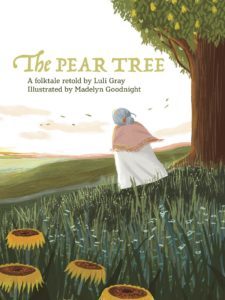
Luli learned the Spanish folk tale of Tia Miseria y La Muerte from Richard’s wife Esther when she lived with them and their seven children in Madrid. She transformed it and made it her own, replacing Miseria (misery) with Esperanza (hope). In Luli’s version, though Death must do his necessary job, there will always be Hope in the world. She worked many years to realize her vision of The Pear Tree, but she couldn’t get it published. A picture book about death? No way.
About nine months after Luli died we heard from her agent: Penny Candy Books wanted to publish The Pear Tree. Crying, I stormed around the house. Why couldn’t this have happened before she died? She wanted it so much, and she would never know. It took a few days, and many emails with her close friends, for me to begin to rejoice.
Luli’s books delight me, but she was not just a writer. Luli was a cook, cartoonist, cat-lover, and above all, generous, loving friend. She had charisma, compounded of eccentricity, humor, and her avid interest in all sorts of subjects – gypsies, lepers, Neanderthals, nuns, books, cats, food, gardens – and especially other people.

Luli’s garden – old shoes are excellent planters
She made friends everywhere and all the time. Some were friendly acquaintances, like the bus drivers with whom she shared gardening stories or the copy store clerk who helped her print her homemade greeting cards. She would meet women at the gym, arrange to meet for coffee, and soon progress to lunches that lasted several hours. And then she had her long-time friends, her New York friend Mary Jane, her neighbor Margaret, Kathryn Hubbell, the group of writers she called the coven, and many others, who came together as Friends of Luli in the hard last year of her life.
Luli and I had the special friendship of sisters. We shared a family history, family culture, jokes and references that only we could understand. We shared love, laughter, and outrage. We visited each other several times a year, and often jointly orchestrated major family celebrations – Christmas dinners, our father’s 90th birthday weekend – with Luli as chef, Lizzy as sous-chef. And we always delighted in performing together.. For Dad’s 85th birthday we hid Luli in a huge, festively-wrapped box behind his chair, and she popped out singing. For the 90th she revised an old song and we performed for the gathering – “F means that you’re fabulous dear Father, A says you’re amazing head to toe…”

“T tells you that you’re the tops and greater than any other daddy that we know”
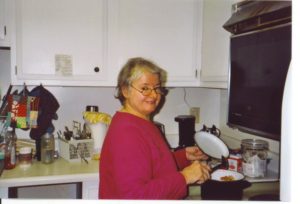
Before my wedding to Joe, Luli spent a day with my friend Mary Anne preparing side dishes for the families’ burgers-and-oysters feast.
Luli loved Joe and Joe loved Luli, though at every visit he would have to endure one prolonged fit of sister giggles. Luli delighted in being outrageous and had a very childish sense of humor. Once she bought a whoopie cushion and kept shifting in her seat as Joe drove, producing long, wet-sounding farts from under her bottom. Joe tried politely to ignore them, but our giggles grew and grew till we were breathless.
Luli and I took care of each other. On a visit to Chapel Hill, I came down with a fever and bronchitis. For a week she fed me garlic soup and single malt as I lay on the couch with her cat on my stomach. After each of my knee surgeries she came to Florida to bring me companionship and cups of tea, and filled the freezer with delicious stews and pies to keep my family fed as I recovered. In her last year I spent a lot of time taking care of her in North Carolina. Those memories are both precious and very painful.
Joe visited Luli for a couple of days shortly before she died, when she was bed-ridden. He read to her from her copy of The Wind in the Willows. He brought her a brown plush mammoth which he had chosen very carefully from the large pile of mammoths at the science museum, comparing tusks and trunks to get one that was just right. Luli kept it in her bed, and now it is on Joe’s bookcase.
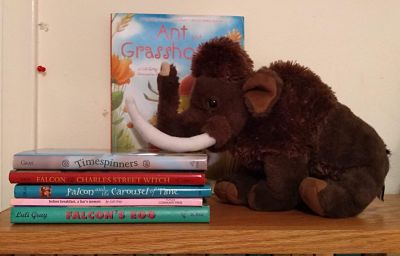
If you’ve lost someone important to you, you know that their death leaves a hole of a particular shape which nothing and no one else can fill. Luli and I talked almost every day, about family, friends, the dire state of the world, and our own troubles and triumphs. She loved my writing. She was eager for my novels to be published, outraged by the years of rejections. She would have been thrilled when I finally sold my first novel. I miss her; we would have shared all the aggravations, delights, anxieties and little triumphs of the time between the contract and the book launch.
I read The Pear Tree for the first time when I was writing this essay. It’s hard for me to read it, because it is about an old woman who tricks Death, and of course Luli didn’t. But it is filled with Luli; I keep going back to it to hear her voice. I am so grateful to her agent, Anna Olswanger, to Penny Candy Books, and especially to Marilyn Goodnight, the illustrator who added her beautiful paintings to Luli’s story.
It’s only fitting that Luli should have the last word, and here she is, again from her memoir:
I have stumbled into a purposeful life. The path may be crooked and overgrown, muddy and stony at times, but it’s there, and I walk it. I have always loved children’s books, and now I write them. Writing is a large part of who I am. I love knowing that my stories connect me to thousands of years of human history. A child comes up to me in a bookstore holding a battered copy of one of my books for me to sign, and I know that I have reached her imagination, nourished her dreams. I sign her book, and touch the hand of that first primordial storyteller who sat beside a hearth fire long ago and said, “Once upon a time…”
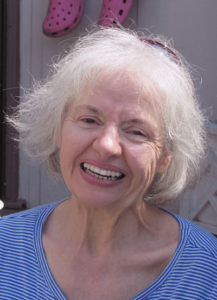
Buy THE PEAR TREE at https://www.pennycandybooks.com/shop/pear-tree

I would love to read Luli’s memoir of your father (my grandmother Vera’s brother!) Any possibility of this…? Thanks, Gail
(Ps – I’m reading and enjoying your novel now!)
Gail – Now you know we’re some kind of cousins, and I so appreciate your keeping up with me. Luli’s book “Before Breakfast, A Liar’s Memoir,” seems to be unavailable anywhere, and the publisher is gone. I have only the one precious copy – don’t know who else might have one. But in the next couple of weeks I will photocopy it, track down your address and send it to you, in gratitude for you being THE FIRST COMMENTER since my blog moved to this webpage!
Thank you, Elizabeth. I can’t wait to read it!
You and my mother were first cousins, I believe that makes us first cousins once removed?
All the best, Gail
Thank you, Liz, for this wonderful memoir. Sisters are special.
A lovely remembrance.